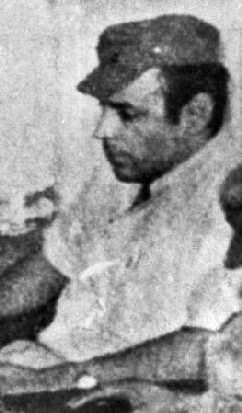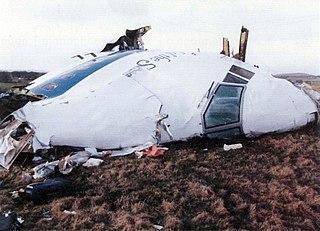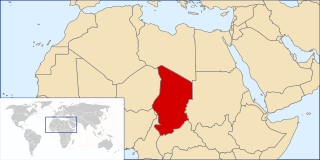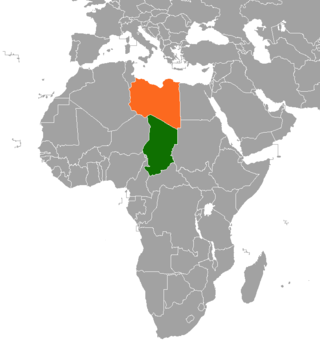| |||||
| Decades: | |||||
|---|---|---|---|---|---|
| See also: | Other events of 1981 List of years in Libya | ||||
The following lists events that happened during 1981 in Libya .
| |||||
| Decades: | |||||
|---|---|---|---|---|---|
| See also: | Other events of 1981 List of years in Libya | ||||
The following lists events that happened during 1981 in Libya .

The foreign relations of Libya under Muammar Gaddafi (1969–2011) underwent much fluctuation and change. They were marked by severe tension with the West and by other national policies in the Middle East and Africa, including the Libyan government's financial and military support for numerous paramilitary and rebel groups.

The United States Air Force, Navy, and Marine Corps carried out air strikes, code-named Operation El Dorado Canyon, against Libya on 15 April 1986 in retaliation for the West Berlin discotheque bombing ten days earlier, which U.S. President Ronald Reagan blamed on Libyan leader Muammar Gaddafi. There were 40 reported Libyan casualties; one U.S. plane was shot down. One of the claimed Libyan deaths was of a baby girl, reported to be Gaddafi's daughter, Hana Gaddafi. However, there are doubts both as to whether she was really killed, or whether she truly existed.

Sabri Khalil al-Banna, known by his nom de guerreAbu Nidal, was a Palestinian militant. He was the founder of Fatah: The Revolutionary Council, a militant Palestinian splinter group more commonly known as the Abu Nidal Organization (ANO). Abu Nidal formed the ANO in October 1974 after splitting from Yasser Arafat's Fatah faction within the Palestine Liberation Organization (PLO).
The Japanese Red Army was a militant communist organization active from 1971 to 2001. It was designated a terrorist organization by Japan and the United States. The JRA was founded by Fusako Shigenobu and Tsuyoshi Okudaira in February 1971, and was most active in the 1970s and 1980s, operating mostly out of Lebanon with PFLP collaboration and funding from Muammar Gaddafi's Libya, as well as Syria and North Korea.

UTA Flight 772 was a scheduled international passenger flight of the French airline Union de Transports Aériens (UTA) operating from Brazzaville in the People's Republic of the Congo, via N'Djamena in Chad, to Charles de Gaulle Airport in Paris, France on 19 September 1989, which crashed into the Ténéré desert near Bilma, Niger, killing all 170 people on board after an in-flight explosion caused by a suitcase bomb. It is the deadliest aviation incident to occur in Niger.

On 5 April 1986, three people were killed and 229 injured when La Belle discothèque was bombed in the Friedenau locality of West Berlin. The entertainment venue was commonly frequented by United States soldiers; two of the dead and 79 of the injured were Americans.

In the first Gulf of Sidra incident, 19 August 1981, two Libyan Su-22 Fitters fired upon two U.S. F-14 Tomcats and were subsequently shot down off the Libyan coast. Libya had claimed that the entire Gulf was their territory, at 32° 30′ N, with an exclusive 62-nautical-mile fishing zone, which Libyan leader Muammar Gaddafi asserted as "The Line of Death" in 1973. Two further incidents occurred in the area in 1986 and in 1989.
Nazih Abdul-Hamed Nabih al-Ruqai'i, known by the alias Abu Anas al-Libi, was a Libyan under indictment in the United States for his part in the 1998 United States embassy bombings. He worked as a computer specialist for al-Qaeda. He was an ethnic Libyan, born in Tripoli.

Muammar Gaddafi became the de facto leader of Libya on 1 September 1969 after leading a group of young Libyan Army officers against King Idris I in a bloodless coup d'état. After the king had fled the country, the Revolutionary Command Council (RCC) headed by Gaddafi abolished the monarchy and the old constitution and established the Libyan Arab Republic, with the motto "freedom, socialism and unity". The name of Libya was changed several times during Gaddafi's tenure as leader. From 1969 to 1977, the name was the Libyan Arab Republic. In 1977, the name was changed to Socialist People's Libyan Arab Jamahiriya. Jamahiriya was a term coined by Gaddafi, usually translated as "state of the masses". The country was renamed again in 1986 as the Great Socialist People's Libyan Arab Jamahiriya, after the United States bombing that year.

Pan Am Flight 103 (PA103/PAA103) was a regularly scheduled Pan Am transatlantic flight from Frankfurt to Detroit via a stopover in London and another in New York City. The transatlantic leg of the route was operated by Clipper Maid of the Seas, a Boeing 747 registered N739PA. Shortly after 19:00 on 21 December 1988, while the aircraft was in flight over the Scottish town of Lockerbie, it was destroyed by a bomb, killing all 243 passengers and 16 crew in what became known as the Lockerbie bombing. Large sections of the aircraft crashed in a residential street in Lockerbie, killing 11 residents. With a total of 270 fatalities, it is the deadliest terrorist attack in the history of the United Kingdom.

The Chadian–Libyan War was a series of military campaigns in Chad between 1978 and 1987, fought between Libyan and allied Chadian forces against Chadian groups supported by France, with the occasional involvement of other foreign countries and factions.
The Islamic Legion was a Libyan-sponsored pan-Arabist and pan-Islamist paramilitary force, created in 1972. The Legion was part of Muammar Gaddafi's dream of creating the Great Islamic State of the Sahel.

The Toyota War, also known as the Great Toyota War, which took place in 1987 in Northern Chad and on the Chad–Libya border, was the last phase of the Chadian–Libyan War. It takes its name from the Toyota pickup trucks, primarily the Toyota Hilux and the Toyota Land Cruiser, used to provide mobility for the Chadian troops as they fought against the Libyans, and as technicals. The 1987 war resulted in a heavy defeat for Libya, which, according to American sources, lost one tenth of its army, with 7,500 men killed and US$1.5 billion worth of military equipment destroyed or captured. Chadian forces suffered 1,000 deaths.

Chad–United States relations are the international relations between Chad and the United States.

Libya–United States relations are the bilateral relations between the State of Libya and the United States of America. Relations are today cordial and cooperative, with particularly strong security cooperation only after the 2012 attack on the US liaison office or mission in Benghazi. Furthermore, a Gallup poll conducted in March and April 2012 found that Libyans had "among the highest approval" of US leadership in the entire Middle East and North Africa region.

Chad–France relations are the diplomatic relations between the Republic of Chad and the French Republic. France controlled Chad from 1900 until the country's independence in 1960. Both nations are today members of the Francophonie and the United Nations.

Chad–Libya relations have arisen out of centuries from ethnic, religious, and commercial ties.

Franco-Libyan relations are the relations between Libya and France. For the most part, their historical relations are complicated. Libya maintains its embassy in Paris. France also has an embassy in Tripoli.

The 2012 Benghazi attack was a coordinated attack against two United States government facilities in Benghazi, Libya, by members of the Islamic militant group Ansar al-Sharia. On September 11, 2012, at 9:40 p.m. local time, members of Ansar al-Sharia attacked the American diplomatic compound in Benghazi resulting in the deaths of both United States Ambassador to Libya J. Christopher Stevens and U.S. Foreign Service Information Management Officer Sean Smith. At around 4:00 a.m. on September 12, the group launched a mortar attack against a CIA annex approximately one mile (1.6 km) away, killing two CIA contractors Tyrone S. Woods and Glen Doherty and wounding ten others. Initial analysis by the CIA, repeated by top government officials, indicated that the attack spontaneously arose from a protest. Subsequent investigations showed that the attack was premeditated—although rioters and looters not originally part of the group may have joined in after the attacks began.

The Libyan civil war (2014–2020), also known as the Second Libyan Civil War, was a multilateral civil war which was fought in Libya among a number of armed groups, but mainly the House of Representatives (HoR) and the Government of National Accord (GNA), for six years from 2014 to 2020.